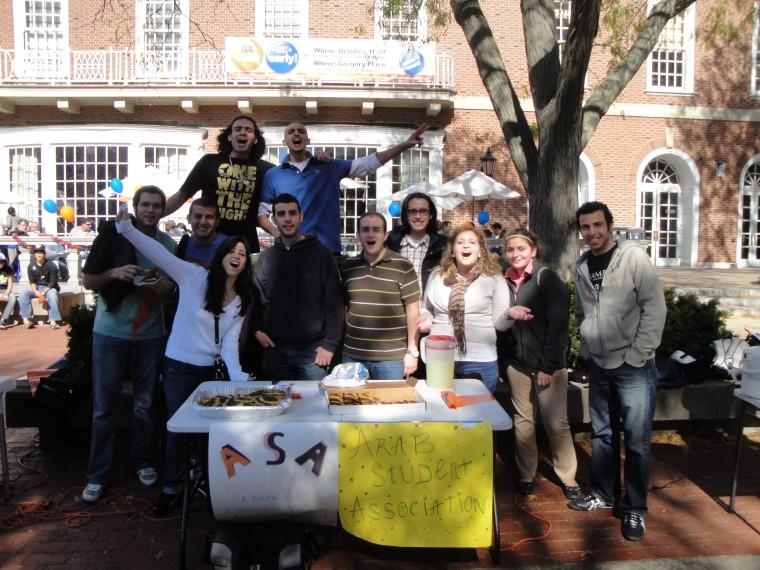Bringing the Arab world a little closer to home
September 1, 2011
At the age of 1, Layal Khouri arrived in the U.S. with her parents, escaping instability in Lebanon brought on by the Gulf War. Nearly two decades later, the Middle East is again beset with turmoil, and like many other Arab University students, Khouri is trying to help in the Arab-democratic movements in any way she can.
“The Middle East is an area where conflict has been for years,” said Khouri, president of the Arab Student Association, or ASA, and junior in LAS. “As we see these uprisings happen, there’s a lot of things American people can do … that impact how America deals with the Middle East.”
The ASA, according to its Facebook page, strives “to spread awareness about issues pertaining to Arabs and Arab societies.”
Khouri said many Americans are ignorant of the conditions for citizens in Syria and Libya, and this year the association is planning on staging protests on the Quad and inviting speakers to talk about the current conflicts.
“Being so far away, we can’t really be involved in the actual protesting there, but we can make our voices heard to our campus,” said Khouri, pointing out that the ASA participated in protests last year against former Egyptian President Hosni Mubarak. “We plan to do more of those events concerning Syria and Libya,” she said.
Get The Daily Illini in your inbox!
The physical distance between Arab students on campus and the countries of their lineage can be both distressing and frustrating, explained Yassar Bittar, previous president of ASA and senior in LAS. Bittar was born in the U.S., but her family emigrated from Syria in the 1980s. Like many Arab students, Bittar is in consistent contact with those on the front lines of the Syrian uprising.
“When I talk to my friends on the ground, they (say), ‘Even though these are the hardest days of our lives, these are also the best days of our lives,’” said Bittar, who uses Skype to communicate with a handful of students and youths from the town of Homs.
“The government has used every weapon against them,” Bittar said. “There’s no fear anymore. Whatever is going to happen is going to happen as long as (the Syrian people) do what they think is right.”
Though displaced from the danger in Syria, Bittar is acutely aware of the risks that Syrian citizens face when they choose to protest against the government. A cousin of her father’s was arrested and tortured by the government and was forced to flee to Saudi Arabia, and she knows of those who have been killed in the city of Homs.
While Kouri’s birthplace of Lebanon has so far avoided destabilization and rebellion, Kouri emphasized that the country, like the rest of the Middle East, is intrinsically affected by the state of other Arab countries.
Nasser Anssari, graduate student and native of Jordan, pointed to positive results of the current uprisings.
“Jordan has a long border with Syria,” Anssari said, “and there are many refugees coming over and food supplies are being provided for them across the border.”
However, the interconnectedness of the Middle East is best displayed by the widespread struggle for democracy in the Arab world, Khouri said.
“The Middle East wants to be, as we’ve seen now, as democratic as possible,” she said. “We want to see the Middle East a place that resembles the USA — where people can live in peace and democracy, have freedom of choice (and) freedom of speech.”
Bittar said that for all the lofty expectations of the Arab Spring, she is too pragmatic to believe that Syria will reach true peace and democracy quickly. The fall of Al-Assad’s regime will assuredly bring the Syrian people a better country, but it may be followed by periods of turmoil as government infrastructure must deal with its own widespread corruption as well as the danger of sectarian or ethnic violence.
Yet, despite potential decades of struggle to come, Bittar said the Syrian people still revel in the blissful novelty of free expression.
“You see the videos of people getting shot and killed, but you also see videos of these young men dancing and enjoying their lives — enjoying the fact that they can speak freely,” Bittar said. “At the ASA, we hope to show both sides of the situation.”
While the ASA plans programming around Middle East conflicts, Khouri emphasizes that the organization also serves as a cultural and educational resource for the student Arab population and for those interested in the Middle East.
“We’re just here to get to know each other, get to learn more about the Arab world and raise awareness about people back home.”







